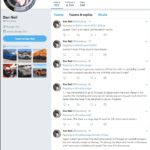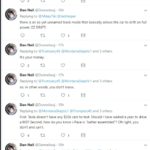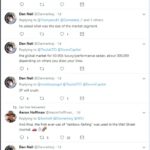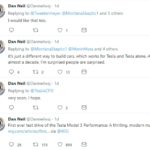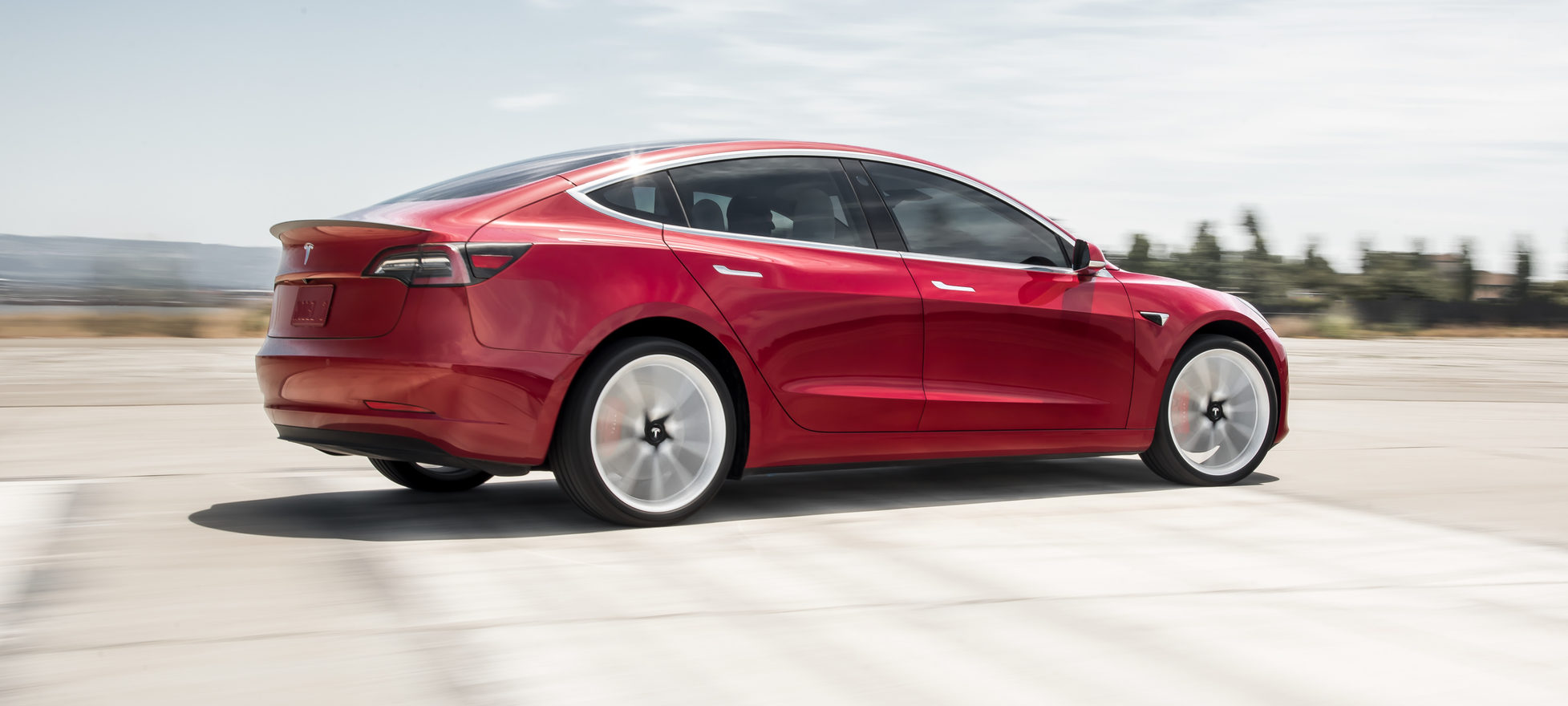
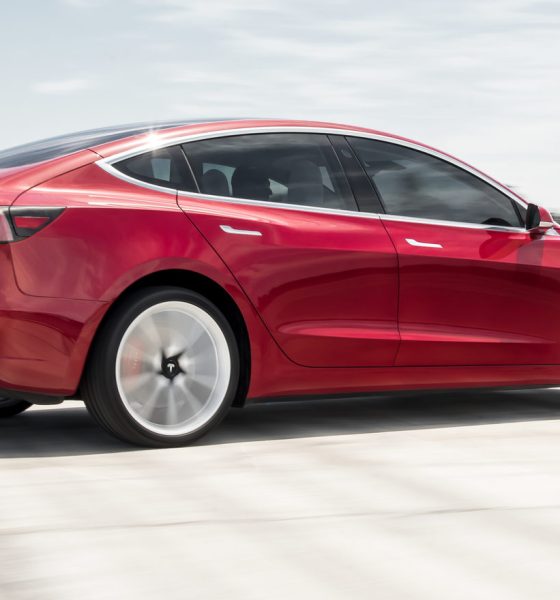
Investor's Corner
Tesla shorts drive Pulitzer-winning journalist off Twitter after glowing review of Model 3 Performance
The Tesla Model 3 recently got its first professional review from a veteran auto journalist. In an article published in the Wall Street Journal, Pulitzer-winning journalist Dan Neil gave the Model 3 performance a glowing review, stating that the car is a “magnificent” piece of automotive engineering that is “representative of the next step in the history of autos.”
Tesla is currently offering test drives for the Model 3 Performance in selected showrooms across the United States. Key publications such as CNET‘s Roadshow also posted teasers about an upcoming review of the vehicle. Based on Neil’s report, the Model 3 Performance is being touted as one of the electric car company’s best vehicles as of date — one that can push Tesla to new heights.
Dan Neil’s review of the Model 3 Performance was largely positive. Though he stated that the car would have performed better had it been equipped with better tires, and he likened the vehicle’s 15-inch touchscreen as the “broken flower pot on Mona Lisa’s head,” Neil was nonetheless impressed by the electric sedan. Neil noted in his WSJ article that while Tesla as a company has its own fair share of issues, including those fueled by CEO Elon Musk’s actions on Twitter, the Model 3 Performance is a star, considering its speed, raw power, and handling. Neil’s observations about the car’s performance mirrored some of the conclusions of Sandy Munro, who conducted a teardown of the Long Range RWD Model 3. Just like Neil, Munro gave a positive review of the vehicle’s capabilities, even stating that whoever designed and tuned the Model 3’s suspension could easily be an “F1 Prince.”
Thanks Dan, you are a tough reviewer, so this means a lot coming from you. Please lmk even smallest nuance that can be improved. https://t.co/eRuPyN1p7I
— Elon Musk (@elonmusk) July 19, 2018
Neil’s positive review did not sit well with Tesla’s staunchest critics. His Twitter feed, for one, was quickly filled with vitriol. The comments section of his Model 3 Performance review in the Wall Street Journal were filled with much of the same criticism as well. Neil defended himself on both places, and on Twitter, he ended up crossing tweets with some notable Tesla short-sellers, including Mark Spiegel and the vocal MontanaSkeptic1, who recently debated Tesla bull Galileo Russell on the Quoth the Raven podcast. Over the weekend, and amidst what appeared to be an overwhelming amount of negativity from Tesla shorts, Neil opted to delete his Twitter account. Fellow automotive reporter Urvaksh Karkaria posted a tweet later on claiming that Neil decided to let his Twitter account go because of the responses to his Model 3 Performance review.
so #teslatwitter ran @Danneilwsj off Twitter. humans are so overrated. a damn shame, really.
— Urvaksh (@Urvaksh) July 20, 2018
Screenshots of Neil’s final hours on Twitter were captured by members of the Tesla Motors Club, and from what could be seen in the images, the Pulitzer-winning journalist was engaging Spiegel and the MontanaSkeptic1 before he deleted his account. Both Tesla shorts seemed to have taken issue about why Neil has not reviewed the Jaguar I-PACE yet, as well as the $35,000 Standard Range RWD Model 3. One of Neil’s responses to Spiegel also gave the impression that the Tesla short was suggesting the vehicle given to the journalist was “prepped” especially for him (a notion that Neil described as having “no possibility”).
Dan Neil’s Twitter feed, filled with responses to Tesla shorts, before he deleted his account. [Source: Twitter]
Overall, it is unfortunate to see journalists of Dan Neil’s caliber be subjected to criticism simply because he wrote down his opinions about the Tesla Model 3 Performance. Neil, after all, might be friendly with Musk, but he is never one to shy away from questioning the CEO’s statements. Back in 2011 alone, Neil made a bet with Musk about when the company could start producing the Model S. In an article in the Los Angeles Times, Neil described Musk’s timetable for the all-electric sedan as an “audacious timeline that makes many in the car industry roll their eyes.”
Tesla might be controversial amidst Elon Musk’s occasional Twitter outbursts and the company’s tendency to meet its target timelines later than expected, but at the end of the day, the vehicles it produces ultimately speak for themselves. After all, professional reviewers like Neil, who are veterans of the auto industry, are praising the Model 3 Performance not because of Elon Musk’s rockstar status, but because of its own merits. And that, ultimately bodes well for Tesla.

Elon Musk
Tesla stock gets latest synopsis from Jim Cramer: ‘It’s actually a robotics company’
“Turns out it’s actually a robotics and Cybercab company, and I want to buy, buy, buy. Yes, Tesla’s the paper that turned into scissors in one session,” Cramer said.

Tesla stock (NASDAQ: TSLA) got its latest synopsis from Wall Street analyst Jim Cramer, who finally realized something that many fans of the company have known all along: it’s not a car company. Instead, it’s a robotics company.
In a recent note that was released after Tesla reported Earnings in late January, Cramer seemed to recognize that the underwhelming financials and overall performance of the automotive division were not representative of the current state of affairs.
Instead, we’re seeing a company transition itself away from its early identity, essentially evolving like a caterpillar into a butterfly.
The narrative of the Earnings Call was simple: We’re not a car company, at least not from a birds-eye view. We’re an AI and Robotics company, and we are transitioning to this quicker than most people realize.
Tesla stock gets another analysis from Jim Cramer, and investors will like it
Tesla’s Q4 Earnings Call featured plenty of analysis from CEO Elon Musk and others, and some of the more minor details of the call were even indicative of a company that is moving toward AI instead of its cars. For example, the Model S and Model X will be no more after Q2, as Musk said that they serve relatively no purpose for the future.
Instead, Tesla is shifting its focus to the vehicles catered for autonomy and its Robotaxi and self-driving efforts.
Cramer recognizes this:
“…we got results from Tesla, which actually beat numbers, but nobody cares about the numbers here, as electric vehicles are the past. And according to CEO Elon Musk, the future of this company comes down to Cybercabs and humanoid robots. Stock fell more than 3% the next day. That may be because their capital expenditures budget was higher than expected, or maybe people wanted more details from the new businesses. At this point, I think Musk acolytes might be more excited about SpaceX, which is planning to come public later this year.”
He continued, highlighting the company’s true transition away from vehicles to its Cybercab, Optimus, and AI ambitions:
“I know it’s hard to believe how quickly this market can change its attitude. Last night, I heard a disastrous car company speak. Turns out it’s actually a robotics and Cybercab company, and I want to buy, buy, buy. Yes, Tesla’s the paper that turned into scissors in one session. I didn’t like it as a car company. Boy, I love it as a Cybercab and humanoid robot juggernaut. Call me a buyer and give me five robots while I’m at it.”
Cramer’s narrative seems to fit that of the most bullish Tesla investors. Anyone who is labeled a “permabull” has been echoing a similar sentiment over the past several years: Tesla is not a car company any longer.
Instead, the true focus is on the future and the potential that AI and Robotics bring to the company. It is truly difficult to put Tesla shares in the same group as companies like Ford, General Motors, and others.
Tesla shares are down less than half a percent at the time of publishing, trading at $423.69.
Elon Musk
Tesla to a $100T market cap? Elon Musk’s response may shock you

There are a lot of Tesla bulls out there who have astronomical expectations for the company, especially as its arm of reach has gone well past automotive and energy and entered artificial intelligence and robotics.
However, some of the most bullish Tesla investors believe the company could become worth $100 trillion, and CEO Elon Musk does not believe that number is completely out of the question, even if it sounds almost ridiculous.
To put that number into perspective, the top ten most valuable companies in the world — NVIDIA, Apple, Alphabet, Microsoft, Amazon, TSMC, Meta, Saudi Aramco, Broadcom, and Tesla — are worth roughly $26 trillion.
Will Tesla join the fold? Predicting a triple merger with SpaceX and xAI
Cathie Wood of ARK Invest believes the number is reasonable considering Tesla’s long-reaching industry ambitions:
“…in the world of AI, what do you have to have to win? You have to have proprietary data, and think about all the proprietary data he has, different kinds of proprietary data. Tesla, the language of the road; Neuralink, multiomics data; nobody else has that data. X, nobody else has that data either. I could see $100 trillion. I think it’s going to happen because of convergence. I think Tesla is the leading candidate [for $100 trillion] for the reason I just said.”
Musk said late last year that all of his companies seem to be “heading toward convergence,” and it’s started to come to fruition. Tesla invested in xAI, as revealed in its Q4 Earnings Shareholder Deck, and SpaceX recently acquired xAI, marking the first step in the potential for a massive umbrella of companies under Musk’s watch.
SpaceX officially acquires xAI, merging rockets with AI expertise
Now that it is happening, it seems Musk is even more enthusiastic about a massive valuation that would swell to nearly four-times the value of the top ten most valuable companies in the world currently, as he said on X, the idea of a $100 trillion valuation is “not impossible.”
It’s not impossible
— Elon Musk (@elonmusk) February 6, 2026
Tesla is not just a car company. With its many projects, including the launch of Robotaxi, the progress of the Optimus robot, and its AI ambitions, it has the potential to continue gaining value at an accelerating rate.
Musk’s comments show his confidence in Tesla’s numerous projects, especially as some begin to mature and some head toward their initial stages.
Elon Musk
Tesla director pay lawsuit sees lawyer fees slashed by $100 million
The ruling leaves the case’s underlying settlement intact while significantly reducing what the plaintiffs’ attorneys will receive.

The Delaware Supreme Court has cut more than $100 million from a legal fee award tied to a shareholder lawsuit challenging compensation paid to Tesla directors between 2017 and 2020.
The ruling leaves the case’s underlying settlement intact while significantly reducing what the plaintiffs’ attorneys will receive.
Delaware Supreme Court trims legal fees
As noted in a Bloomberg Law report, the case targeted pay granted to Tesla directors, including CEO Elon Musk, Oracle founder Larry Ellison, Kimbal Musk, and Rupert Murdoch. The Delaware Chancery Court had awarded $176 million to the plaintiffs. Tesla’s board must also return stock options and forego years worth of pay.
As per Chief Justice Collins J. Seitz Jr. in an opinion for the Delaware Supreme Court’s full five-member panel, however, the decision of the Delaware Chancery Court to award $176 million to a pension fund’s law firm “erred by including in its financial benefit analysis the intrinsic value” of options being returned by Tesla’s board.
The justices then reduced the fee award from $176 million to $70.9 million. “As we measure it, $71 million reflects a reasonable fee for counsel’s efforts and does not result in a windfall,” Chief Justice Seitz wrote.
Other settlement terms still intact
The Supreme Court upheld the settlement itself, which requires Tesla’s board to return stock and options valued at up to $735 million and to forgo three years of additional compensation worth about $184 million.
Tesla argued during oral arguments that a fee award closer to $70 million would be appropriate. Interestingly enough, back in October, Justice Karen L. Valihura noted that the $176 award was $60 million more than the Delaware judiciary’s budget from the previous year. This was quite interesting as the case was “settled midstream.”
The lawsuit was brought by a pension fund on behalf of Tesla shareholders and focused exclusively on director pay during the 2017–2020 period. The case is separate from other high-profile compensation disputes involving Elon Musk.
